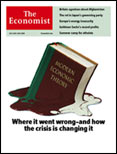
The Economist has had as a cover story What went wrong with economics and the Financial Times has asked What is the point of economists? We argue that in addition to the orthodox Monetarist and Keynesian economic frameworks, the Austrian School deserves attention. Moreover, with Murray Rothbard and the Mises Institute, we believe the science of economics is overdue a true paradigm shift: a change in basic assumptions.
Via Ludwig von Mises and the Paradigm for Our Age – Murray N. Rothbard – Mises Institute:
The fundamental paradigm, once established, is no longer tested or questioned, and all further research soon becomes minor applications of the paradigm, minor clearing up of loopholes or anomalies that still remain in the basic vision. For years, decades, or longer, scientific research becomes narrow, specialized, and always within the basic paradigmatic framework.
But then, gradually, more and more anomalies pile up; puzzles can no longer be solved by the paradigm. But the scientists do not give up the paradigm; quite the contrary, increasingly desperate attempts are made to modify the particulars of the basic theory so as to fit the unpleasant facts and to preserve the framework provided by the paradigm.
Only when anomalies pile up to such an extent that the paradigm itself is brought into question do we have a “crisis situation” in science. And even here, the paradigm is never simply discarded until it can be replaced by a new, competing paradigm which appears to close the loopholes and liquidate the anomalies.
When this occurs, there arrives a “scientific revolution,” a chaotic period during which one paradigm is replaced by another, which never occurs smoothly as the Whig theory would suggest. And even here, the older scientists, mired in their intellectual vested interests, will often cling to the obsolete paradigm, with the new theory only being adopted by the younger and more flexible scientists. Thus, of the codiscoverers of oxygen in the late 18th century, Priestley and Lavoisier, Joseph Priestley never — till the day he died — conceded that he had in fact discovered oxygen; to the end he insisted that what he had discovered was merely “dephlogisticated air,” thus remaining within the framework of the phlogiston theory.
And so, armed with Kuhn’s own paradigm of the history of scientific theories, which is now in the process of replacing the Whig framework, we see a very different picture of the process of science. Instead of a slow and gradual upward march into the light, testing and revising at each step of the way, we see a series of “revolutionary” leaps, as paradigms displace each other only after much time, travail, and resistance.
Furthermore, without adopting Kuhn’s own philosophical relativism, it becomes clear that, since intellectual vested interests play a more dominant role than continual open-minded testing, it may well happen that a successor paradigm is less correct than a predecessor. And if that is true, then we must always be open to the possibility that, indeed, we often know less about a given science now than we did decades or even centuries ago.
Because paradigms become discarded and are never looked at again, the world may have forgotten scientific truth that was once known, as well as added to its stock of knowledge. Reading older scientists now opens up the distinct possibility that we may learn something that we haven’t known — or have collectively forgotten — about the discipline. Professor de Grazia states that “much more is discovered and forgotten than is known,” and much that has been forgotten may be more correct than theories that are now accepted as true.
…
The answer — which obviously cannot be documented in the compass of this article — is simply and startlingly this: that Ludwig von Mises offers to us nothing less than the complete and developed correct paradigm of a science that has gone tragically astray over the last half century. Mises’s work presents us with the correct and radically divergent alternative to the flaws, errors, and fallacies which a growing number of students are sensing in present-day economic orthodoxy.
…
Briefly, Mises’s economic system — as set forth particularly in his Human Action — grounds economics squarely upon the axiom of action: on an analysis of the primordial truth that individual men exist and act, that is, make purposive choices among alternatives. Upon this simple and evident axiom of action, Ludwig von Mises deduces the entire systematic edifice of economic theory, an edifice that is as true as the basic axiom and the fundamental laws of logic.
The entire theory is the working out of methodological individualism in economics, the nature and consequences of the choices and exchanges of individuals. Mises’s uncompromising devotion to the free market, and his opposition to every form of statism, stems from his analysis of the nature and consequences of individuals acting freely on the one hand, as against governmental coercive interference or planning on the other.
For, basing himself on the action axiom, Mises is able to show the happy consequences of freedom and the free market in social efficiency, prosperity, and development, as against the disastrous consequences of government intervention in poverty, war, social chaos, and retrogression. This political consequence alone, of course, makes the methodology as well as the conclusions of Misesian economics anathema to modern social science.
…
In short, Mises shows that the market economy is a finely constructed, interrelated web; and coercive intervention at various points of the structure will create unforeseen troubles elsewhere. The logic of intervention, then, is cumulative; and so a mixed economy is unstable — always tending either toward full-scale socialism or back to a free-market economy. The American farm-price support program, as well as the New York City rent-control program, are almost textbook cases of the consequences and pitfalls of intervention.
…
The instability of the interventionist welfare-state system is now making fully clear the fundamental choice that confronts us between socialism on the one hand and capitalism on the other. Perhaps the most important single contribution of von Mises to the economics of intervention is also the one most grievously neglected in the present day: his analysis of money and business cycles. We are living in an age when even those economists supposedly most devoted to the free market are willing and eager to see the state monopolize and direct the issuance of money. Yet Mises has shown that
- there is never any social or economic benefit to be conferred by an increase in the supply of money;
- the government’s intervention into the monetary system is invariably inflationary;
- therefore, government should be separated from the monetary system, just as the free market requires that government not intervene in any other sphere of the economy.
…
Specifically, expansion of bank money causes an artificial lowering of the rate of interest, and an artificial and uneconomic overinvestment in capital goods: machinery, plant, industrial raw materials, and construction projects. As long as the inflationary expansion of money and bank credit continues, the unsoundness of this process is masked, and the economy can ride on the well-known euphoria of the boom; but when the bank credit expansion finally stops, and stop it must if we are to avoid a runaway inflation, then the day of reckoning will have arrived.
…
There is no more fitting conclusion to a tribute to Ludwig von Mises than the moving last sentences of his greatest achievement, Human Action:
The body of economic knowledge is an essential element in the structure of human civilization; it is the foundation upon which modern industrialism and all the moral, intellectual, technological, and therapeutical achievements of the last centuries have been built. It rests with men whether they will make the proper use of the rich treasure with which this knowledge provides them or whether they will leave it unused. But if they fail to take the best advantage of it and disregard its teachings and warnings, they will not annul economics; they will stamp out society and the human race.
Thanks in no small measure to the life and work of Ludwig von Mises, we can realistically hope and expect that mankind will choose the path of life, liberty, and progress and will at last turn decisively away from death and despotism.
Following Kuhn, Rothbard and Mises, we may be on the verge of a paradigm shift in economics as the inconsistencies, inappropriate simplifications and downright errors of current economic thinking reveal themselves.
Social progress depends upon it.
Further Reading
- Mises, Human Action
- Our primer

